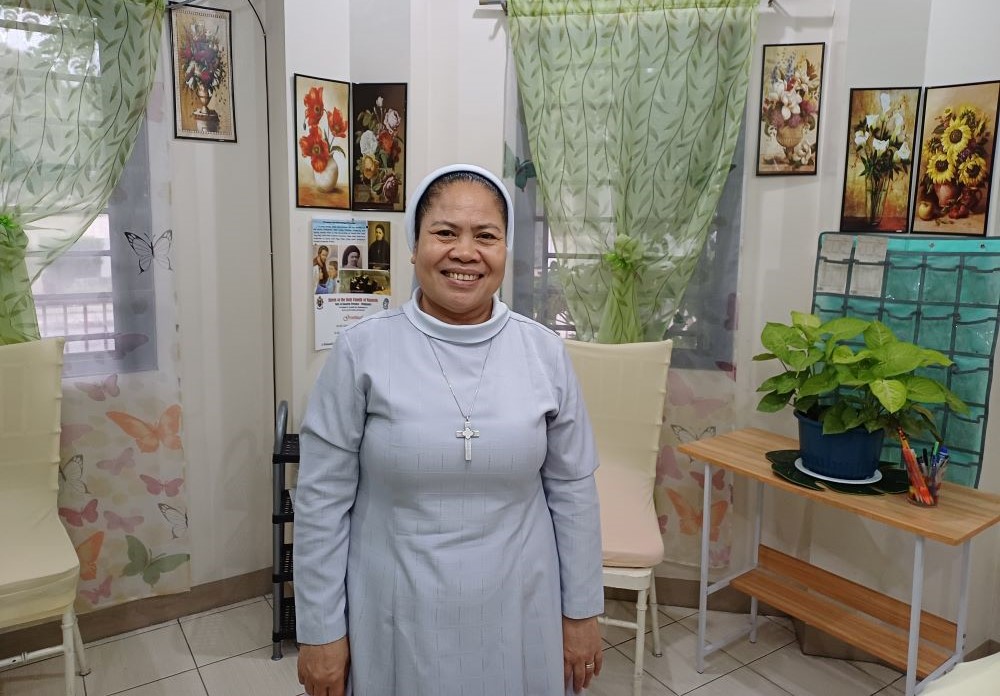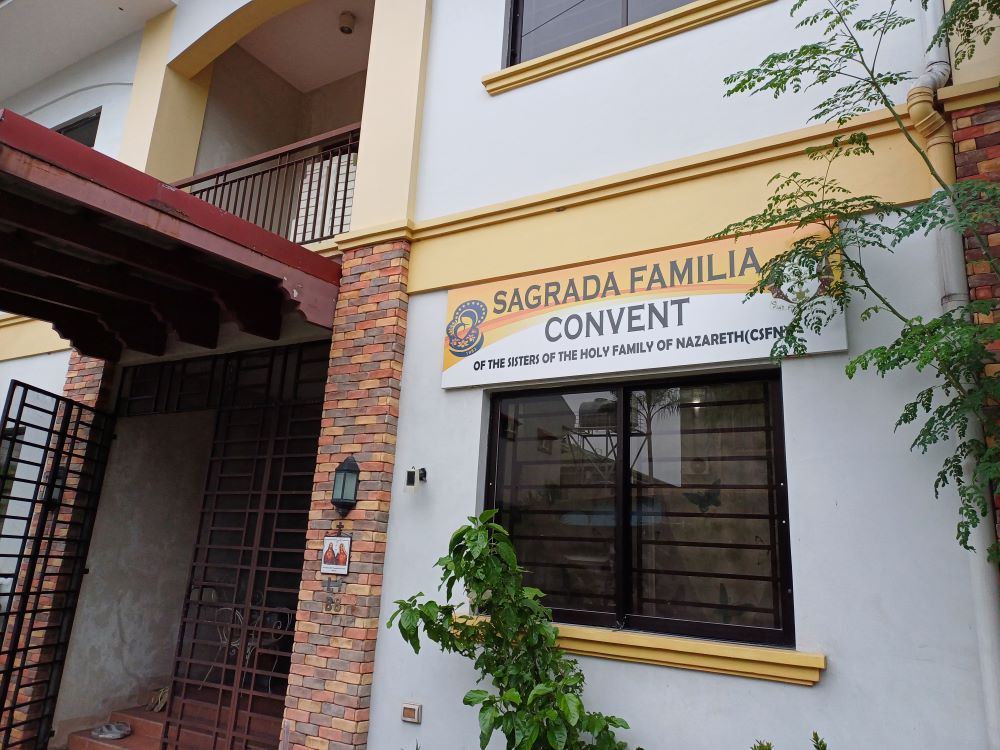
Sr. Angelina Julom stands at the Nazareth Psycho-Social Wellness Center for Individuals and Families in Cainta, Rizal, Philippines. (Oliver Samson)
Sr. Angelina Julom joined the Sisters of the Holy Family of Nazareth as an aspirant in 1985, visiting informal settlers and providing spiritual needs, like sacraments and Bible studies. She also taught nursery students during her earlier years as a nun, making her final profession of vows in 1996.
During high school, she noticed that relatives and friends would approach her and confide about things that troubled them. Her advice helped ease their woes, but she believed she needed training to become more capable of helping people experiencing challenges in life.
She completed a bachelor's degree in psychology at St. Joseph College of Quezon City after a period of discernment, finished her master's in clinical psychology in 2004 and started teaching at the University of Santo Tomas in 2005. In 2009, she completed her doctorate in clinical psychology at UST, the oldest university in the Philippines, run by the Dominicans.
Julom enjoys seeing patients at the Nazareth Psycho-Social Wellness Center for Individuals and Families in Cainta, Rizal, Philippines. As a nun, she finds people trust her even more as a psychologist.
GSR: How long have you been teaching psychology? And how do you advise your students?
Julom: I started teaching in 2005 as an instructor. Then, I became an assistant professor in 2012.
I always remind my students to set goals and write them down. I also ask them to focus on their goals. If they want to graduate with Latin honors, I tell them to set their objectives daily.
I often tell them that when they plan for the future, they should always include their parents. They should never forget that their parents are instrumental in finishing their studies. They should also let their parents feel that they are concerned about them.
I encourage them to show care, especially when their parents are tired from work, like offering a massage. Even simple gestures of love like that can please their parents.
Some young people today [believe] that they did not ask their parents to give birth to them and that their parents should not ask for responsibility. But that is painful for their parents.
So, I let my students understand that their parents will get old and become helpless. [This is the] time to pay [them] back. That's the responsibility of children to their parents. And parents see hope in their children.
I also remind my students that they will become parents, get old and need care.
GSR: How long have you been seeing patients?
Julom: [The] people who asked me for guidance were the ones who inspired me to study psychology. Even before I entered the convent, people confided in me and asked for guidance.
I gave them advice based on what I learned from the Bible. My parents were very religious. I grew up very religious, too. Before I entered the convent, I was a catechist. I was a leader of catechists and provided formations.
After I entered the convent, people still asked me for guidance, and I was willing to help [them] and took it seriously. Then, I [felt] I should study psychology because it seemed that something would be missing if I gave advice from only the spiritual perspective since there's [also] the human side.
When the patient is not religious, advising may not go [smoothly]. Some non-religious patients are [too] shy to talk and ask for forgiveness from God; they think of themselves [as] not worthy of his attention.

The convent of the Sisters of the Holy Family of Nazareth in Cainta, Rizal, Philippines (Oliver Samson)
GSR: Does your spirituality inform your approach to your patients?
Julom: Yes, very much. For me, my spirituality is my relationship with God. And when I do things, I believe it is God's will.
So, when a patient comes to me, I say, "Lord, you are the one who brings this person to me. Help me to help this person because you are the one who knows what he needs."
That is effective for me because psychology without spirituality is limited.
I sometimes get so tired when a patient becomes very dependent on me. Even at night, they call, especially when they have anxiety and panic attacks — some are even suicidal.
I found a [type of] psychotherapy that is psycho-spiritual — very effective. [It's called] logotherapy, healing through meaning. Logotherapy was developed by Victor Frankl.
Like Frankl, I believe that when the psychological and physical aspects of the person are weak, he has to hold on to his spiritual side because the spiritual side of the person does not get sick.
In my clinical practice, I find logotherapy very effective. Many people who have problems tend to look for spirituality. Because they can't handle [their] problems anymore, they look for someone more powerful.
Of course, they come because they trust the psychologist. But we, as psychologists, also seek to reconcile the person with God because they are afraid to relate with God because they feel guilty.
So, I tell the patients that forgiveness is important. They are [truly] loved by God, and God is merciful and the most loving. This gives them assurance and confidence to face their problems because they know God can help them.
GSR: Do you advise fellow nuns, especially members of your congregation?
Julom: Through a workshop. A workshop seems better than a personal [encounter].
Some sisters who experienced failure become afraid to assume new work. [I] restore their confidence by reminding them of their talents and accomplishments and that everybody makes mistakes.
There is also behavior that could have a root cause from their childhood. How the person grew up could influence their behavior.
A sister may not be aware, but the community sees an issue. Sometimes, you need to talk to the person. But it takes a gentle approach and a lot of patience.
GSR: How is mental health viewed in our culture today?
Julom: Most Filipinos today are aware of mental health and how to maintain it. They need to know their abilities. They need to practice their talents and use them to become a contributor to their family and society.
But the stigma is still there. This stigma is not only in the Philippines but also in other parts of the world. It discriminates against people with mental health issues.
People with mental health issues are aware of this stigma. When people consider them harmful, they also consider themselves harmful.
I witnessed this stigma. Back home, parents told their children not to marry a partner with a history of mental health issues. So, it's very difficult to get rid of this discrimination, even in the workplace, for fear that they might harm other people.
Our mental health law guarantees [that] mental health services [are made] available for everyone, but most of our psychologists and psychiatrists don't practice in remote areas due to a lack of payment. The treatment is also expensive.
Some families still believe in bad spirits and blame them for the mental health condition of a family member.
The stigma and telling the patient negative things do not help. Negative conversations, comments and criticism don't help.
I involve the family in the treatment of the patient, who could have repeatedly received harmful criticism from family members for many years. Changing the family relationship into a positive one could help the problem.
Advertisement
GSR: How do you separate your religious beliefs from objective psychological advice?
Julom: Sometimes, I feel the need to separate religious beliefs in treating the person when he practices a different religion or when he is non-religious.
When the person practices another religion, I ask if he believes in a supreme being. That is to remind and assure the person that he has someone more powerful to hold on to.
The sense of being isolated, rejected and unloved is common among patients. Regardless of religious beliefs, he can get stronger when he knows he has a loving and forgiving God. Strong spirituality is helpful.





